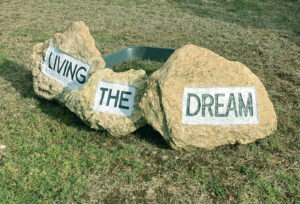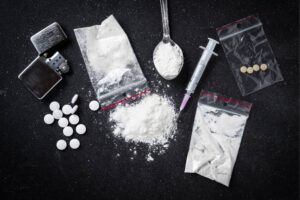People who are addicted to substances and deal with depression have two forces working against them at all times. Substances are often used to ease the pain of mental health conditions like depression.
If you get stuck in a cycle where your substance of choice is the only thing that feels like it alleviates your depression symptoms, it’s easy to fall into full-blown drug addiction.
Recognizing the signs that someone you know might be struggling with both, and offering up your support and guidance to the right resources, can lead to someone getting treatment. To do that, you need to understand depression, its causes and signs, and the symptoms that go with it. Then you can learn about ways to intervene and help out — while avoiding a strain on your relationship.
What Is Drug Addiction and Depression?
Drug addiction, or substance use disorder, is a chronic disorder that disrupts your daily functioning because of compulsive drug-seeking behaviors. People who struggle with drug addiction become reliant on how that drug makes them feel. They will often do whatever is necessary to get ahold of more.
When occasional recreational substance use becomes an addiction, people can experience both mental and physical decline.
Depression is a mental disorder that impacts people both physically and mentally. Depending on the drug and the frequency, mental health and behavioral changes can range from minor to severe. It doesn’t take long for these drugs to impact how you function and take care of yourself.
You might not care that much about your own well-being, leading to risky behaviors that harm yourself and others. Many people with depression find themselves experiencing a lack of motivation, an inability to care for themselves properly, and a general disinterest in their own lives and the lives of others.
When someone is struggling with one of these disorders alone, it can be difficult, but together, the combination can potentially become fatal that much faster. Unfortunately, these two conditions often go hand-in-hand. Of course, these actions cause a rift in long-term relationships. But there is hope.
How Do They Connect?
There are a few crossovers between depression and drug addiction. You don’t always become addicted to drugs due to your depression, or vice versa, but it does happen. People who suffer from substance use disorder are more likely to be depressed because what comes with addiction can be very difficult.
Addiction can cause a loss of friends and family, financial struggle, and even homelessness. The reality of drug addiction can cause someone to experience situations they never imagined for themselves, which often leads to further feelings of hopelessness. Drug addiction causes increasing isolation from the positive things and people that matter and can cause depressive symptoms to keep spiraling downward.
People who are depressed might look to self-medication in order to limit some of their symptoms. For instance, many people who struggle with depression will use alcohol to forget and numb the pain or marijuana to provide some sort of relief from the stress of life. Again, the two are not mutually exclusive, but treating one without the other might not always provide the best results.
How Can You Tell if Someone Needs Help?
If a close friend or family member is beginning to show signs of either depression or drug addiction, it isn’t always so obvious. Everyone can express these signs in different ways. Not all depressed or drug-addicted people behave the same way. However, there are a few different signs that might come to light in regards to your friend’s well-being.
These are a few of the more common signs of addiction and depression:
- A person might begin to withdraw from friends and family.
- They might become easily irritated and angered, snapping out of nowhere.
- They might not speak to you for days, weeks, or even months, seemingly disappearing.
- Not showing up for events or gatherings without being under the influence.
- Missing work, school, or other important events.
- Having erratic sleep schedules and more frequent health issues.
- Asking for money or showing other signs that they are struggling financially.
How To Help
If you recognize that someone you love might be in need of support and assistance, figuring out how you can help is the hardest part. Everyone is different and reacts to support and the idea of seeking treatment in different ways.
For the best outcome, it’s important that you don’t imply or state that you are angry or disappointed with them, but rather that you love and want to help them. You may not understand what your loved one is going through, but you can still offer your non-judgemental support.
Asking for help is sometimes impossible, and while a person might not appreciate it at the moment, offering help that someone desperately needs is always worthwhile in the end. There are a few ways that you can help someone who is struggling with drug addiction and depression without bombarding and overwhelming them.
Understand that not everyone is going to immediately jump at the idea of entering into an inpatient rehab program. However, showing them the options that are available to them can help plant the seed to get them started in the right direction when they feel ready.
Show Support
Being a shoulder to lean on, offering your time, and letting people talk are just a few ways for you to show support. Showing up for your loved one is what they truly need right now. Both depression and drug addiction can be isolating diseases. Knowing someone is in your corner can make the fight worth it.
No one likes the symptoms of depression or being addicted to drugs for the entirety of their life. Getting out of these conditions alone is not always possible.
Suggest a sober living environment to detox and move forward in a safe place. Attend support meetings with your loved one, help them find the right professionals that can hold them accountable for their actions, and check in to let them know that you are thinking of them during the long road to recovery.
Find a Treatment Center
Not everyone who struggles with both depression and drug addiction has the energy to look for treatment centers. They may lack the energy or motivation to even get out of bed and start their day.
Offer a list of substance abuse treatment centers to make sobriety and treatment feel possible. Find a place that will take into consideration the needs of your loved one and address your concerns, as well as create a personalized treatment plan to guide you and yours to success.
A treatment center that will truly help will have many options for treatment, including detoxification treatments and partial hospitalization. Your loved one’s struggles will not be the same as yours, so talking with these centers about their treatment can help pinpoint what might be the most impactful way to spur them to action.
Getting Help at Soba Recovery
When your friend enters the Soba Recovery Center in San Antonio, Texas, they can be sure to get personalized plans geared to their needs. Drug addiction and depression need to be treated both separately and together in order to get to the root of the problem and come up with working solutions. You cannot treat one without the other.
With both inpatient and outpatient services, we can work with your loved one to figure out what treatment plan will address the issues at hand while we work toward sober living. Medical professionals and therapists are available at all times when help is needed. Those with severe addiction are monitored 24/7.
If Soba Texas seems like a place they’d like to be, reach out to a representative and discuss all of their options. Of course, once we get to know your loved one better, we can come up with a plan that fits their situation to help ensure long-lasting success.
Sources:
Drug Misuse and Addiction | National Institute on Drug Abuse (NIDA)





